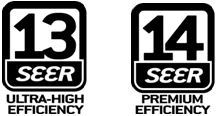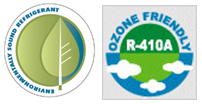
“We only rent this planet from our children”
This is a quote we all keep in the back of our minds at the Phoenix Mechanical. Not to ease our consciences but to remind us that we must help contribute to the solution, not the problem. With growing concerns over environmental issues and the need to conserve energy, we can help you choose eco-friendly equipment that will suit your needs, help you save money by reducing operating costs and in turn help the environment by reducing electricity and fossil fuel consumption. In today’s market, clients can choose from any of the options listed on the right. |
|

| |
Heating equipment with higher Annual Fuel Utilization Efficiency (AFUE) ratings

AFUE ratings are essentially a measure of the true amount of energy you are getting out of your appliance while the fuel is burning (if an appliance has an AFUE rating of 92%, this means you are getting $0.92 for every $1.00 dollar you put into the appliance in fuel costs.) This does not include the electrical energy consumption of the appliance.
 Cooling Equipment with higher Seasonal Energy Efficiency Ratio (SEER) ratings Cooling Equipment with higher Seasonal Energy Efficiency Ratio (SEER) ratings
It is commonly used to measure efficiency of air conditioners and other cooling appliances that consume electricity.
As of January 2006, an air conditioner must have a SEER rating of at least 13 when sold in North America.
The higher the SEER rating the more efficient the air conditioner will be.
Examples of this are motors and compressors that are part of the cooling system that use less electricity due to their advanced engineering and designs.
Energy Star Related Appliances
 The ENERGY STAR symbol is a simple way for consumers to identify products that are among the most energy-efficient on the market. The ENERGY STAR symbol is a simple way for consumers to identify products that are among the most energy-efficient on the market.
The labelled products could save you hundreds of dollars in energy costs such as fuel and electricity.
By choosing ENERGY STAR labelled products, buyers save energy and money on utility bills, reduce air pollution without sacrificing the features, versatility or style they expect from high-performing products.

CFC’S & HCFC’S free cooling systems
Ozone depleting refrigerants are in good for the environment which in turn is not good for us.
HCFC phase out including R22 refrigerants will be phased out of production by 2010 by at least 65%. The goal is to have all HCFC refrigerants phased out by 2020. This is definitely something to think about!
With 2010 approaching and the cost of R22 Refrigerants on the rise, it makes sense to look at HFC (hydrofluorocarbon) refrigerant systems such as R-410 A as an option since this will be the leading technology into the next decade. |
|
|